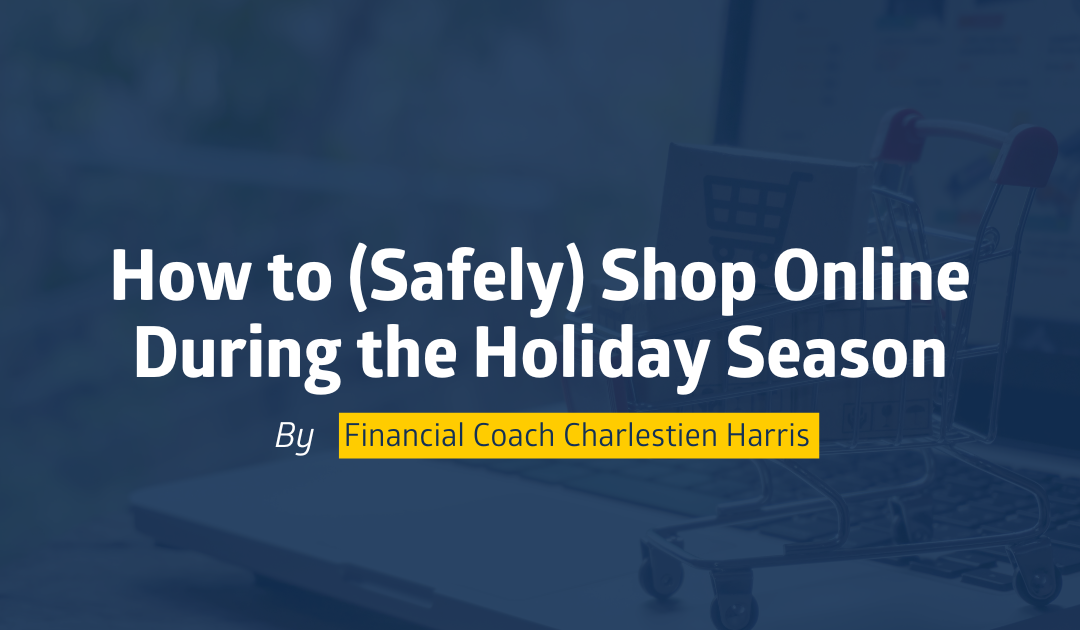At this time of year, everyone is gearing up for a busy online shopping season, but especially the crafty and cunning scammer. Everybody is looking for that special deal, hard-to-find items, or great percentage-off sales that will save a shopper quite a bit of money. The risks of getting scammed are higher during the holidays because so often we let our guards down, and the scammers are just waiting for that vulnerable moment when you do!
But don’t worry – you can keep your money safe by following these simple online shopping tips.
1. Shop with reputable retailers. It’s best to shop directly with online retailers you know and trust. Bookmark your favorite shopping sites to get there quickly and safely. Look for secure websites and make sure they are legitimate. Avoid using public Wi-Fi. Don’t blindly trust search results! Review each site for the accuracy of information and a secure payment system in place. Make every attempt possible to guard your personal information. No shopping website should ever ask for your Social Security number. If a site does request this type of very personal information, run in the other direction.
2. Beware of too-good-to-be-true deals. Remember, if an offer looks too good to be true, then it probably is. The FBI found that many sites at the center of its recent consumer complaints were advertised on social media platforms. You should also compare prices before you buy. Unusually low prices could be a red flag that you’ve landed on a fake site that’s been set up to collect your personal information or steal your money.
3. Do not browse on public Wi-Fi. As mentioned above, avoid shopping while using public Wi-Fi because a hacker could be spying on your online activity. Shopping online often requires giving out information that an identity thief would love to get their hands on, including your name, address, and credit card number. You should also establish strong passwords. A strong password is like a secure lock that keeps cyberthieves out of the accounts where you store your private information.
4. Check the site’s security before you buy. Looking for a lock icon in the browser bar of a site allows you to verify that they use SSL (Secure Sockets Layer) or TLS (Transport Layer Security) encryption. The URL also should start with “https” rather than just “http.” Protect your computer by using security software. You can also be proactive yourself by protecting your accounts using multi-factor authentication. This action can act as an extra layer of protection when you are online shopping.
5. Don’t fall for email scams. This is a very common method of internet fraud. Delete suspicious messages from unfamiliar senders and don’t open attachments or click links in messages because they could infect your computer or phone with viruses and other malware. Email scams are one of the most common ways a fraudster uses to gain access to your personal or financial information during this time of the year. They often count on a large number of people shopping online to snag those great bargains we often search for.
6. Practice paying with a credit card instead of a debit card. A credit card doesn’t give a seller direct access to the money in your bank account. Also, most credit cards offer $0 liability for fraud. That means you’re not out any money if a crook uses your account info to make a purchase. Your credit card company will ask questions, investigate the fraudulent activity, and send you a new card. Keep a very sharp eye out for fraud. Check your bank and credit card statements for fraudulent charges at least once a week. Or set up account alerts to notify you of any new activity on your card. When you receive a text or email notification, you can check your account to make sure you recognize the charge.
7. Track your purchases. Most online retailers will allow you to do that. After you make an online purchase, keep tabs on it to make sure it’s headed your way. If the merchant refuses to provide shipping info or respond to your requests for the status of your order, contact your credit card issuer for help. They may remove the charge from your bill and possibly investigate the matter.
In 2023, Cyber Monday retailers raked in over $12.4 million in sales, according to Axios. That was a 9.6 percent increase over last year! But as more and more consumers are turning to online shopping to make convenient purchases, online shopping can be very harmful and wreak havoc with your finances if you are not careful. The good news is that by taking just a few security measures, you can greatly reduce your exposure to all these threats. Enjoy your holiday shopping – and be safe!
For more information about this and other financial topics, you can contact me at Charlestien.Harris@banksouthern.com or call me at 662-624-5776.
Until next week – stay financially fit!

